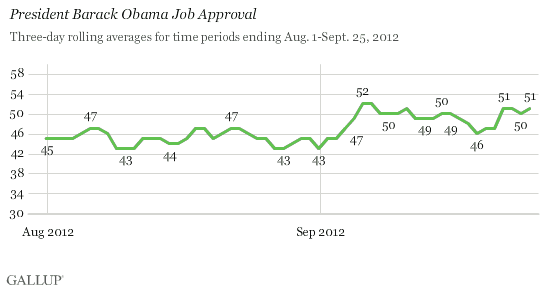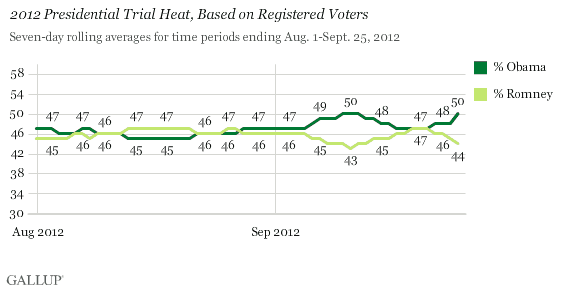PRINCETON, NJ -- President Barack Obama's job approval rating has been 50% or higher in each of the last four Gallup Daily tracking figures, including a 51% rating in the latest three-day rolling average, from Sept. 23-25. This nearly matches the level of approval for Obama that Gallup found at the end of the Democratic National Convention earlier this month. His approval then dipped into the 40s by mid-month before rebounding to 51% late last week.

More generally, September is turning out to be one of Obama's best months in over a year: he is on track to average roughly 49% job approval this month, up from 45% in August and 41% in September 2011.
At the same time, the president is enjoying increased support from voters in Gallup Daily tracking of presidential election preferences. Registered voters favor Obama over his Republican challenger Mitt Romney by 50% to 44% in Gallup Daily tracking from Sept. 19-25. As is seen with his job approval rating, voter support for Obama is now similar to where it stood toward the end of the Democratic convention, after a week in mid-September when the race had collapsed to a tie.

Bottom Line
Several important events have taken place in the past month that may indicate the boundaries in which the final stretch of the 2012 presidential campaign will play out.
First, the Republican National Convention produced no bounce in support for Romney, leaving the race a virtual tie. Next, the Democratic National Convention boosted Obama's support by three percentage points, not big by historical bounce standards, but enough to give him a significant lead for the first time since July. The race then tightened again, possibly reflecting a fading of Obama's convention bounce or a backlash against Obama over anti-American violence in the Mideast, including the death of the U.S. ambassador to Libya on Sept. 11. The race remained close over several days when the primary news focus was on Romney's Sept. 18 comments about the "47%" of Americans who are dependent on government, but most recently has reverted to a six-point lead for Obama.
Over the same period, Obama's job approval rating has ranged from 43% to 52%, levels historically associated with either near-certain defeat or near-certain re-election for an incumbent. Obama is currently at the high end of that range, and has had more good days than bad this month, in terms of achieving job approval ratings of 49% or better. But there have been enough dips below that to suggest the race is far from over.
Looking forward, with three presidential debates scheduled and two more jobs reports coming out before Election Day, there is plenty of opportunity for voter preferences to swing back and forth in this range, even without further international incidents or campaign controversies.
Survey Methods
The recent job approval results are based on telephone interviews conducted as part of Gallup Daily tracking Sept. 23-25, 2012, with a random half-sample of 1,556 adults, aged 18 and older, living in all 50 U.S. states and the District of Columbia, selected using random-digit-dial sampling.
For results based on the total sample of national adults, one can say with 95% confidence that the maximum margin of sampling error is ±3 percentage points.
The recent presidential trial heat results are based on telephone interviews conducted as part of Gallup Daily tracking Sept. 19-25, 2012, with a random half-sample of 3,272 registered voters, aged 18 and older, living in all 50 U.S. states and the District of Columbia.
For results based on the total sample of registered voters, one can say with 95% confidence that the maximum margin of sampling error is ±3 percentage points.
Interviews are conducted with respondents on landline telephones and cellular phones, with interviews conducted in Spanish for respondents who are primarily Spanish-speaking. Each sample includes a minimum quota of 400 cell phone respondents and 600 landline respondents per 1,000 national adults, with additional minimum quotas among landline respondents by region. Landline telephone numbers are chosen at random among listed telephone numbers. Cell phone numbers are selected using random-digit-dial methods. Landline respondents are chosen at random within each household on the basis of which member had the most recent birthday.
Samples are weighted by gender, age, race, Hispanic ethnicity, education, region, adults in the household, and phone status (cell phone only/landline only/both, cell phone mostly, and having an unlisted landline number). Demographic weighting targets are based on the March 2011 Current Population Survey figures for the aged 18 and older non-institutionalized population living in U.S. telephone households. All reported margins of sampling error include the computed design effects for weighting and sample design.
In addition to sampling error, question wording and practical difficulties in conducting surveys can introduce error or bias into the findings of public opinion polls.
For more details on Gallup's polling methodology, visit www.gallup.com.
